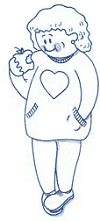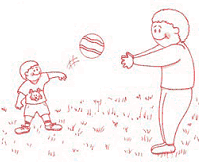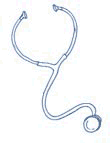How well children will learn and develop and how well they will do in school depends on a number of things, including the children's health and
physical well-being, their social and emotional preparation and their language skills and general knowledge of the world.
Seeing to it that your preschool child has nutritious food, enough exercise and regular medical care gives him* a good start in life and lessens the chances that he will have serious health problems or trouble learning later on.
Food
Preschoolers require a healthy diet. After your child is born, she requires nutritious food to keep her healthy. School-aged children can concentrate better in class if they eat balanced meals that include servings of breads and cereals; fruits and vegetables; meat, poultry and fish and meat alternatives (such as eggs and dried beans and peas); and milk, cheese and yogurt. You should see to it that your child does not eat too many fatty foods and sweets.
Children aged 2-5 generally can eat the same foods as adults but in smaller portions. Your child's doctor or medical clinic adviser can provide you with advice on what to feed a baby or a toddler who under the age of 2.
If you need food for your child, federal, state and local programs can help. For example, the federal nutrition program, called the Special Supplemental Food Program for Women, Infants and Children (WIC), distributes food to low-income women and their children across the country. Food stamp programs also are available. If you want more information or want to find out if you are eligible for food stamps, call or visit your local or state health department. Your local librarian can help you find names, addresses and phone numbers.
 Exercise
Exercise
Preschoolers need opportunities to exercise. To learn to control and coordinate the large muscles in his arms and legs, your child needs to throw and catch balls, run, jump, climb and dance to music. To learn to control and coordinate the small muscles in his hands and fingers, he needs to color with crayons, put together puzzles, use blunt-tipped-
safety-scissors, zip his jacket and grasp small objects such as coins.
If you suspect that your child has a disability, see a doctor as soon as possible. Early intervention can help your child to develop to his full potential.
Medical Care
Preschoolers require regular medical checkups, immunizations and dental care. It's important for you to find a doctor or a clinic where your child can receive routine health care as well as special treatment if she becomes sick or injured.

Early immunizations can help prevent a number of diseases including measles, mumps, German measles (rubella), diphtheria, tetanus, whooping cough, hib (Haemophilus influenzae type b), polio and tuberculosis. These diseases can have serious effects on your child's physical and mental development. Talk to your doctor about the benefits and risks of immunization. (Please note: Some parents and doctors do not agree that immunizations are important. Others have objections to them based on religious or cultural teachings.)
Beginning by the age of 3 at the latest, your child also should have regular dental checkups.
Helping Your Preschool Child Get Ready to Learn: